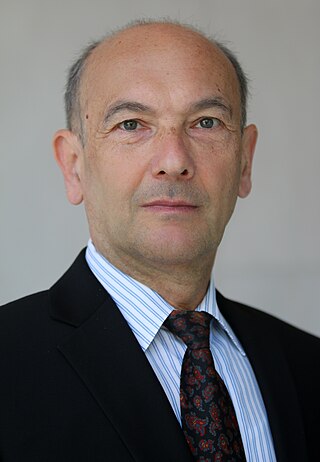
The Center for Strategic and International Studies (CSIS) is an American think tank based in Washington, D.C. From its founding in 1962 until 1987, it was an affiliate of Georgetown University, initially named the Center for Strategic and International Studies of Georgetown University. The center conducts policy studies and strategic analyses of political, economic and security issues throughout the world, with a focus on issues concerning international relations, trade, technology, finance, energy and geostrategy.

Stephen Anthony Cambone was the first United States Under Secretary of Defense for Intelligence, a post created in March 2003. Cambone first came to the attention of the public at large during the testimony of Major General Antonio Taguba before the U.S. Senate Armed Services Committee, where he disputed the General's statement that prison guards were under the effective control of military intelligence personnel and interrogators. Cambone resigned at the beginning of 2007 and was replaced by James R. Clapper, Jr., former head of the Defense Intelligence Agency (DIA) and the National Geospatial-Intelligence Agency. Cambone was associated with the Project for the New American Century, participating in the study which resulted in the writing of the report Rebuilding America's Defenses.

The Jamestown Foundation is a Washington, D.C.–based conservative defense policy think tank. Founded in 1984 as a platform to support Soviet defectors, its stated mission today is to inform and educate policy makers about events and trends, which it regards as being of current strategic importance to the United States. Jamestown publications focus on China, Russia, Eurasia, and global terrorism.

Anthony H. Cordesman was an American national security analyst. He held the Arleigh A. Burke Chair in Strategy at the Center for Strategic and International Studies (CSIS) and was a national security analyst on a number of global conflicts.

John Julian Hamre is an American international relations scholar and former senior defense official. He is the president and CEO of the Center for Strategic and International Studies, a position he has held with since 2000.

Per Anders Åslund is a Swedish economist and former Senior Fellow at the Atlantic Council. He is also a chairman of the International Advisory Council at the Center for Social and Economic Research (CASE).
Seth G. Jones is an academic, political scientist, author, and former senior official in the U.S. Department of Defense. Jones is most renowned for his work on defense strategy, the defense industrial base, irregular warfare, and counterterrrorism. Much of his published work and media interviews are on defense strategy; Chinese, Russian, and Iranian conventional and irregular capabilities and actions; and terrorist and insurgent groups such as al-Qaeda and the Islamic State. He is currently a senior vice president at the Center for Strategic and International Studies.
Igor Rotar is a Russian journalist. From 2003 to early 2007 he was the Central Asian news correspondent for Forum 18, a human rights organization based in Norway that promotes religious freedom. He is a Russian citizen.

Taras Kuzio is a Professor of Political Science at the National University of Kyiv-Mohyla Academy. His area of study is Russian and Ukrainian political, economic and security affairs.
Ariel Cohen is a political scientist focusing on political risk, international security and energy policy, and the rule of law. Cohen currently serves as the Managing Director of the Energy, Growth, and Security Program] (EGS) at the International Tax and Investment Center (ITIC), an independent, nonprofit research and education organization founded in 1993 to promote tax reform and public-private initiatives to improve the investment climate in transition and developing economies.
Shireen Tahmaaseb Hunter is an independent scholar. Until 2019, she was a Research Professor at the Center for Muslim-Christian Understanding (ACMCU) at Georgetown University in Washington, D.C., with which she had been associated since 2005, as Visiting Fellow and then Visiting Professor. She became an honorary fellow of ACMCU in September 2019.
Sidney Weintraub was an economist, foreign service officer, professor, non-fiction author, and novelist.

Igor Alexandrovich Zevelev is a Russian political scientist.
In June 1991, representatives of Bosnian Muslims and Bosnian Serbs met to discuss the future status of SR Bosnia and Herzegovina during the Yugoslav crisis.

Aaron Wess Mitchell is an American foreign policy expert and former diplomat who was the Assistant Secretary of State for European and Eurasian Affairs from October 2017 until February 2019. Prior to assuming the role at State Department, he was president and CEO of the Center for European Policy Analysis. On July 19, 2017, President Donald Trump nominated Mitchell as Assistant Secretary of State for European and Eurasian Affairs.
Howard J. Wiarda was an American academic who was the Dean Rusk Professor of International Relations and Founding Head of the Department of International Affairs at the University of Georgia. He also served in two think tanks in Washington, DC.

Heather A. Conley is president of the German Marshall Fund of the United States (GMF) in Washington, D.C.

The Suwałki Gap, also known as the Suwałki corridor ( ), is a sparsely populated area around the border between Lithuania and Poland, and centres on the shortest path between Belarus and the Russian exclave of Kaliningrad Oblast on the Polish side of the border. Named after the Polish town of Suwałki, this choke point has become of great strategic and military importance since Poland and the Baltic states joined the North Atlantic Treaty Organization (NATO).











